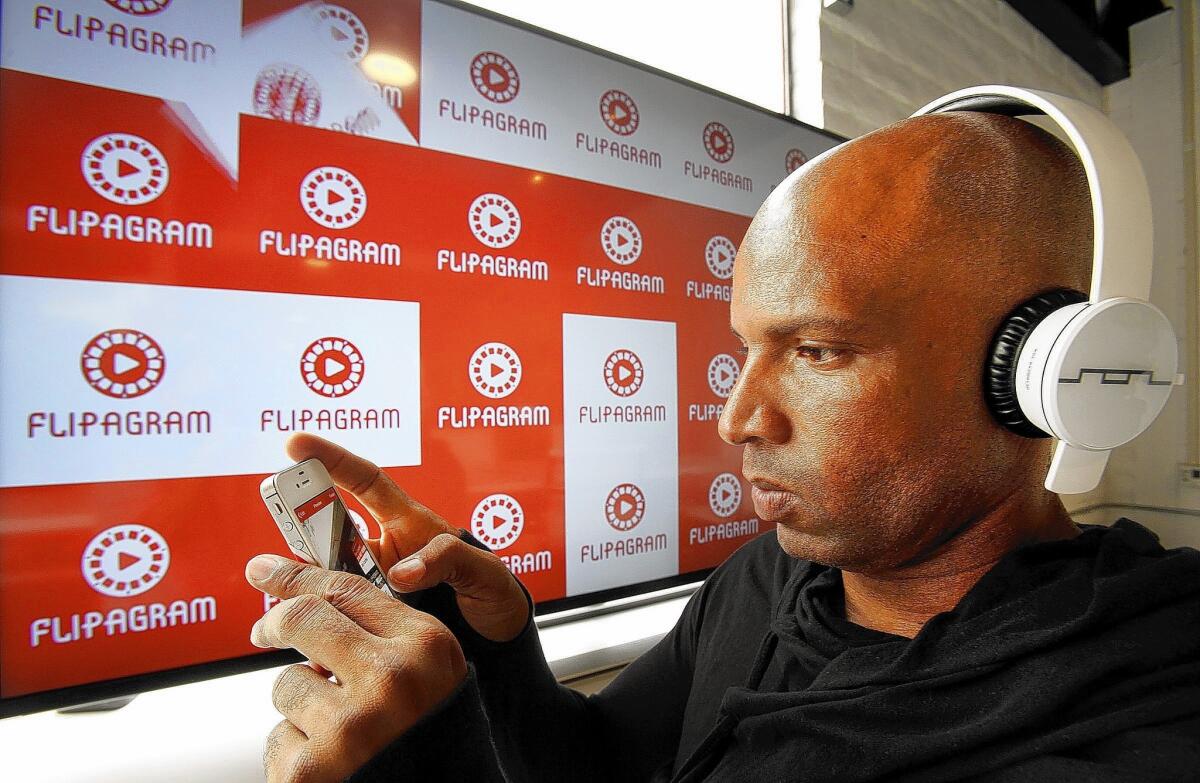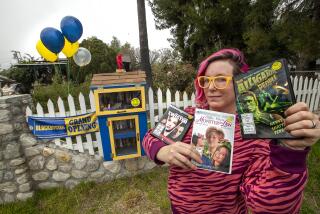Southern California is emerging market for online video start-ups

Fans once lined up at Tower Records on Sunset Strip to get autographs from legends such as Aerosmith and Mariah Carey. Tourists still pose by the iconic building, but it’s the new name on the door — Flipagram — and not the musical lore that’s now drawing gawkers.
The single-story, bright-orange building touted in the 1970s as the world’s largest record store now houses a software company whose smartphone app combines photos and music to create a shareable video. Flipagram’s move this summer into the West Hollywood location underscored the growing influence of online video within the entertainment industry.
More than a dozen start-ups across Southern California, from Silicon Strip to Silicon Beach, are building tools to create, view or make money from online videos. They reflect the hunger for video content on the Web, and the chart-topping advertising rates that come with such videos. A quarter of Internet users worldwide now watch video daily, the research firm TNS recently said.
The start-ups say that if the Southland’s glory comes from musicians and filmmakers, then its continued success hinges on their ability to connect with fans through the most personable medium online — video.
“As things have gone from 4-tracks to records to online, we feel it’s part of our destiny to continue that lineage of entertainment and music stuff,” said Flipagram Chief Executive Farhad Mohit. “We deliberately wanted to be closer to where the music industry is.... People here get it.”
Video-related start-ups are attracting investment and attention in part because they are close to the Hollywood studios, record labels, celebrities and aspiring content makers likely to be users or clients. In addition to Flipagram, Pheebo, Frequency, Jogg, Jukin Media, Zefr and Epoxy are some of the upstarts in the new online video industry.
“The obsessive fascination with video viewing and social sharing in the consumer sector has definitely made its way into corporate boardroom discussions in the past few years,” said Paul Ritter, managing director of the consulting firm Interactive Media Strategies. “There are enormous opportunities for technology companies.”
Over a few days last fall, Flipagram surged from obscurity to the most downloaded photo-video app on Apple’s App Store. Pop stars Beyonce, Britney Spears and One Direction made Flipagrams without any prodding, Mohit said. The company makes money by charging its tens of millions of users for music downloads, and $1.99 for permanent removal of watermarks.
“We look at Flipagram as the best way to tell stories,” Mohit said, adding that low global literacy limits who can read a story whereas videos can attract a much wider audience.
Or as Jukin Media Chief Executive Jonathan Skogmo said, “If it’s blooper video, an ouch is an ouch in any language. It resonates with everyone.”
Jukin, based in Culver City, buys rights to online videos and tries to make them go viral. The company typically looks for amateur action videos such as people falling off trampolines, cars crashing, things exploding or animals being cute.
Jukin content scavengers buy rights to about 15 to 20 such videos a day, and about 90% of them produce revenue. Most video owners ask for an even split of revenue, which can bring an owner $100 to $20,000, Skogmo said. The money comes from YouTube, which places advertising with the video, and licensing fees charged to CNN, ABC News and other media outlets that air the video.
“They want that video because it’s going viral, which brings more virality,” Skogmo said. “It becomes this virtuous [cycle] model.”
Jukin also licenses videos to companies for advertising campaigns, such as Del Taco’s “Epic Burritos” ad. “Your day might not be epic, but your burrito can be,” the ad says after showing a series of homemade “epic fail” videos.
Zefr, one of the largest start-ups in Silicon Beach, the tech haven stretching from Malibu to Marina del Rey, scouts amateur video too. The company encourages movie studios to advertise alongside snippets of films that fans post on YouTube. Zefr Co-Chief Executive Zach James wants to expand to other types of home-made videos.
“People unboxing Nike shoes, people driving around their Toyota cars, moms dancing with their Swiffers,” James said. The idea is for any brand, not just a movie studio, to reward fans who share their real-life experience with a product.
For video makers, Epoxy has built an “inbox” that catches social media posts that mention a particular video. The tool helps creators track and respond to fan messages, a key to building “superfans,” Epoxy says.
This summer, Disney included several video start-ups in a mentorship program for entrepreneurs. Among them: Chris Ordal and his iPhone app called Jogg.
Ordal developed the app to help him make a documentary featuring the memories of those who lived during World War II. With a limited budget, he couldn’t travel to interview the film’s subjects.
With the smartphone app, Ordal can ask questions from anywhere. The subjects can answer by recording themselves using the app. Ordal can sort the responses with the app and edit them into his film.
Ordal said that although it couldn’t capture the nuances of a traditional face-to-face interview, he could still sense the emotions of the subjects. If the app is to catch on, Ordal said, Los Angeles is key.
“L.A. is just a really inspiring place creatively, and this is where video is made,” he said.
Twitter: @peard33







